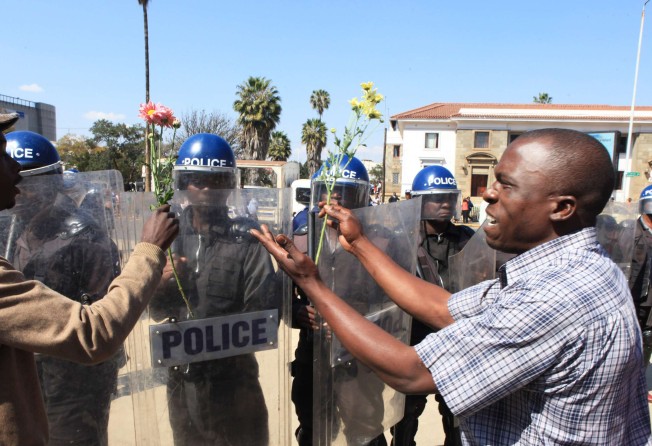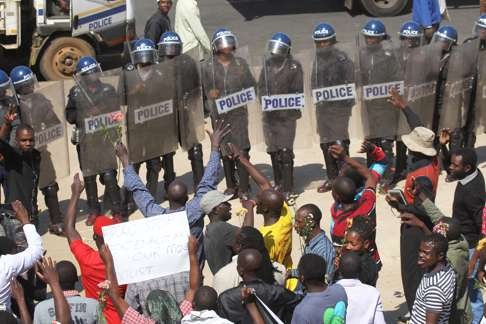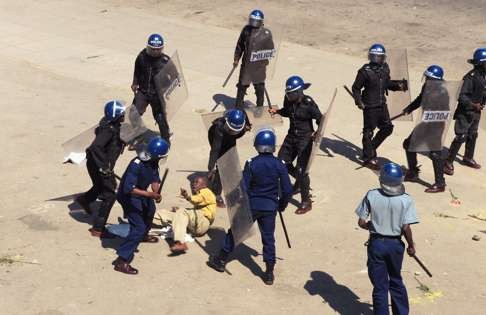Zimbabwe riot police use teargas, water cannon to break up anti-government protest

Police in Zimbabwe fired teargas and water cannon on Wednesday to break up a demonstration in the latest round of the most intense unrest in the former British colony for almost a decade.
About 200 protesters were stopped by riot police as they marched through the streets of Harare, the capital, toward the central bank to protest against a government plan to reintroduce local banknotes.
After a short stand-off, baton charges scattered the demonstrators. Several sustained head injuries.
Promise Mkwananzi, one of the organisers of Wednesday’s protest, pledged a “national shutdown” on August 31. “There will be no business as usual,” he told AFP. “Everybody must participate.”
The new wave of protests has been prompted by the deteriorating economic situation in Zimbabwe.
Many ordinary people fear that the central bank’s plan to introduce banknotes, or “bond notes”, in October to ease the dollar shortage will lead to rampant money printing, as happened in 2008 when inflation hit 500 billion per cent, wiping out people’s savings and pensions.
President Robert Mugabe, who has ruled Zimbabwe for 36 years, has defended the scheme, calling the new notes “surrogate currency” that would discourage criminals from coming to Zimbabwe to “fish” for dollars.
Few ordinary citizens are convinced.
“We know what happens when the central bank prints money. Our message to Mugabe ... is that we don’t want those bond notes,” said Mkwananzi, a leader of the militant social media movement #Tajamuka, slang in the local Shona language for defiance.

Social media has played a key role in the recent protests, which have largely bypassed established opposition parties.
Movements such as #ThisFlag, led by activist pastor Evan Mawarire and #Tajamuka have used Facebook, Twitter and WhatsApp to rally Zimbabweans.
Observers say the pressures on Zanu-PF and Mugabe, who at 92 years old is Africa’s oldest leader, are immense. A series of controversial measures over the last 20 years – such as stripping white farmers of land more than a decade ago – have caused massive economic disruption.
Now the government is struggling to finance its US$4 billion annual budget, and soldiers, police officers, doctors and teachers are being paid weeks in arrears. Foreign investment and donor support has dried up and anticipated aid from China has not materialised. In April the government halved its 2016 growth forecast to 1.4 per cent – an estimate that independent economists believe is optimistic. A drought threatens up to 4 million people with famine.
Officials have appealed to the International Monetary Fund and other major multilateral lenders for aid. Zimbabwe already owes US$8.3 billion, of which US$1.8 billion is in arrears.

Private companies have been nervous about investing in the politically unstable state in recent years, and though the IMF is reportedly keen to restart lending to Zimbabwe, it is likely to demand wide-ranging reforms in return for assistance.
In 2013 Zanu-PF won an election amid widespread claims of vote rigging and some believe further loans would simply allow officials to remain in power. Zimbabwe last witnessed unrest on this scale in April 2007.
Last month veterans of Zimbabwe’s independence war made a significant break with Mugabe for the first time, calling him dictatorial, manipulative and egocentric.
Mugabe has recently turned toward the Zanu-PF youth league for political support, with two rallies attended by tens of thousands of people.
Analysts say an increasingly intense internal battle between factions seeking to take power when the increasingly frail Mugabe dies has significantly weakened the ruling clique’s ability to respond to the economic crisis.